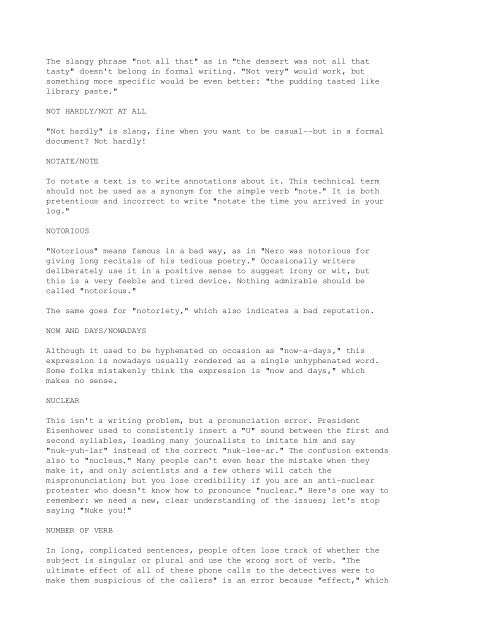Common_Errors_in_English_usage
Common_Errors_in_English_usage
Common_Errors_in_English_usage
Create successful ePaper yourself
Turn your PDF publications into a flip-book with our unique Google optimized e-Paper software.
The slangy phrase "not all that" as <strong>in</strong> "the dessert was not all that<br />
tasty" doesn't belong <strong>in</strong> formal writ<strong>in</strong>g. "Not very" would work, but<br />
someth<strong>in</strong>g more specific would be even better: "the pudd<strong>in</strong>g tasted like<br />
library paste."<br />
NOT HARDLY/NOT AT ALL<br />
"Not hardly" is slang, f<strong>in</strong>e when you want to be casualbut <strong>in</strong> a formal<br />
document? Not hardly!<br />
NOTATE/NOTE<br />
To notate a text is to write annotations about it. This technical term<br />
should not be used as a synonym for the simple verb "note." It is both<br />
pretentious and <strong>in</strong>correct to write "notate the time you arrived <strong>in</strong> your<br />
log."<br />
NOTORIOUS<br />
"Notorious" means famous <strong>in</strong> a bad way, as <strong>in</strong> "Nero was notorious for<br />
giv<strong>in</strong>g long recitals of his tedious poetry." Occasionally writers<br />
deliberately use it <strong>in</strong> a positive sense to suggest irony or wit, but<br />
this is a very feeble and tired device. Noth<strong>in</strong>g admirable should be<br />
called "notorious."<br />
The same goes for "notoriety," which also <strong>in</strong>dicates a bad reputation.<br />
NOW AND DAYS/NOWADAYS<br />
Although it used to be hyphenated on occasion as "nowadays," this<br />
expression is nowadays usually rendered as a s<strong>in</strong>gle unhyphenated word.<br />
Some folks mistakenly th<strong>in</strong>k the expression is "now and days," which<br />
makes no sense.<br />
NUCLEAR<br />
This isn't a writ<strong>in</strong>g problem, but a pronunciation error. President<br />
Eisenhower used to consistently <strong>in</strong>sert a "U" sound between the first and<br />
second syllables, lead<strong>in</strong>g many journalists to imitate him and say<br />
"nukyuhlar" <strong>in</strong>stead of the correct "nukleear." The confusion extends<br />
also to "nucleus." Many people can't even hear the mistake when they<br />
make it, and only scientists and a few others will catch the<br />
mispronunciation; but you lose credibility if you are an antinuclear<br />
protester who doesn't know how to pronounce "nuclear." Here's one way to<br />
remember: we need a new, clear understand<strong>in</strong>g of the issues; let's stop<br />
say<strong>in</strong>g "Nuke you!"<br />
NUMBER OF VERB<br />
In long, complicated sentences, people often lose track of whether the<br />
subject is s<strong>in</strong>gular or plural and use the wrong sort of verb. "The<br />
ultimate effect of all of these phone calls to the detectives were to<br />
make them suspicious of the callers" is an error because "effect," which





